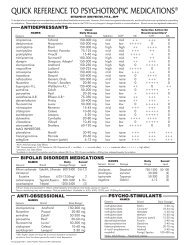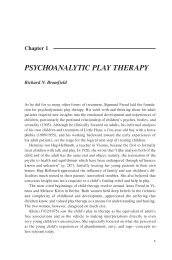IRAQ WAR CLINICIAN GUIDE
Iraq War Clinician's Guide - Network Of Care
Iraq War Clinician's Guide - Network Of Care
You also want an ePaper? Increase the reach of your titles
YUMPU automatically turns print PDFs into web optimized ePapers that Google loves.
Iraq War Clinician Guide 204 Appendix J<br />
AMERICAN ACADEMY OF CHILD & ADOLESCENT PSYCHIATRY<br />
FACTS FOR FAMILIES - NO.88<br />
FAMILIES IN THE MILITARY<br />
Global conflict and unrest have led to deployment of large numbers of military personnel (active<br />
duty, Reserves, National Guard). As a result of duty assignments, members of the military are often<br />
separated for lengthy periods of time from their families and sent to distant, dangerous or unknown<br />
locations. A family that loses the active presence of a parent through separation faces significant<br />
challenges and stress. During the parent's deployment, family members may feel isolated,<br />
unsupported and anxious. They may also experience financial stress. Media coverage of events<br />
can also increase concern.<br />
Some families must also deal with the trauma of having a parent seriously injured or killed.<br />
Families who have little or no contact with extended family andlor the military community may be<br />
especially vulnerable to stress. In families with existing medical, emotional or behavioral<br />
problems, a parent being away can be especially difficult.<br />
While most families and children manage successfully, it is important for parents to be aware of<br />
signs of stress and possibly serious problems. The responses of children to stress of separation are<br />
determined by their individual makeup and developmental age. The following are some common<br />
reactions:<br />
Infants (Birth - 12 months) may respond to disruptions in their schedule, physical environment<br />
or availability of caregivers with decreased appetite, weight loss, irritability andlor apathy.<br />
Toddlers (1-3 yrs.) may become sullen, tearful, throw temper tantrums or develop sleep<br />
problems.<br />
Preschoolers (3-6 yrs.) are more aware of the absence of a parent than younger children and<br />
their behavior may regress in areas such as toilet training, sleep, separation fears, physical<br />
complaints, or thumb sucking. They may personalize situations and express a fear that,<br />
"Daddy left because I was angry at him" or "Mommy stays away because she doesn't love<br />
me."<br />
School age children (6-12 yrs.) are more aware of the realities behind their parent leaving and<br />
the potential dangers. They may show irritable behavior, aggression or whininess. They also<br />
may become more regressed and fearful that their parent may be injured or die.<br />
- Teenagers (13.18 yrs.) may be rebellious, irritable or more challenging of authority. Parents<br />
need to be alert to high-risk behaviors such as problems with the law, sexual acting out, and<br />
drug/alcohol abuse.<br />
A parent leaving home on a military assignment increases the burden on all family members. The<br />
following suggestions can ease the stress:<br />
Talk as a family before the reassignment, sharing information, feelings, worries and plans for<br />
the future. Let your child know that the family member is making a valuable contribution to<br />
their country and the world.<br />
P<br />
DEPARTMENT OF VETERANS AFFAIRS<br />
NATIONAL CENTER FOR PTSD




